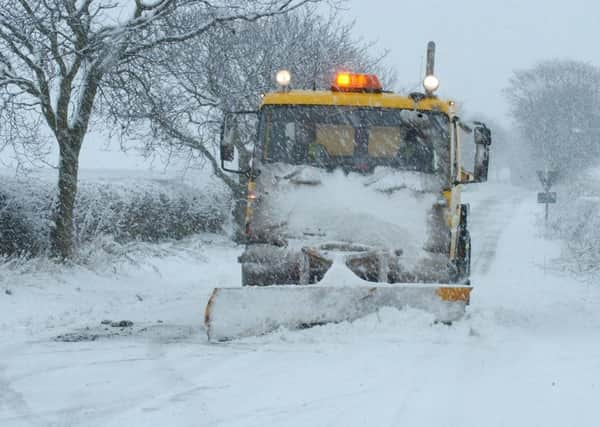'˜Keeping region's roads clear involves lots of planning'


There’s no ‘magic dust’, say those in charge, to keep North Yorkshire’s roads clear. It’s a system of preparing, of stockpiling and navigating, and of always watching the weather.
There are a great many roads in England’s biggest county – around 5,500 miles worth. Some deeply rural, others rarely used. But they form a lifeline to those that do.
Advertisement
Hide AdAdvertisement
Hide AdKeeping them clear is a priority, says Mike Roberts, head of highways operations at the county council. There is a statutory duty, but also a social responsibility. It’s a system of meticulous planning, amidst uncertain wintry weather. And, with a network of farmers and contractors, of leaning on those who can go where the gritters cannot.
“Clearly, it’s impossible for any highway authority to clear and treat every road,” he said. “We are dispersing salt, and pushing snow out of the way with ploughs.
“But it’s not magic dust – we can’t ensure that snow won’t land again. We can’t get to every door, but we can try and get near so that people can access a network. Main roads will be gritted. Where we’re different, is in these links to communities. It’s about getting children to school. Getting people to doctor’s appointments. Ensuring people are able to get to the shops for food.”
North Yorkshire County Council has a budget of more than £6m for winter maintenance. The authority has fewer gritters than in 2010, fewer farming contractors and fewer grit bins. Austerity measures have proved “challenging”, Mr Roberts agreed, but the authority, despite this, has maintained its policy. Operational efficiencies with its contractor have been made, the county council says, allowing it to “grit the same routes but at lower costs”.
Advertisement
Hide AdAdvertisement
Hide Ad“We have looked at how we deliver services,” said Mr Roberts. “The public will not have seen a decrease in services we provide.”
Among the changes are new technologies. Farming contractor Brian Noble is one of those who grits roads around Whitby. He’s been doing it for 41 years, since he secured his driving license at age 16. His father did it before him, and now his son does too.
“With these gritters now, we can nip out where wagons can’t,” he said. “Years ago, it would have been a spade and a shovel. It does keeps traffic moving.”
It’s a way of life for the 57-year-old. He can get the call at 4am, or 9am or even the night before. He’s on call 24 hours a day, and Christmas makes no difference.
Advertisement
Hide AdAdvertisement
Hide AdThere have been times, he said, when the snow’s been so bad he cannot see his bonnet. He once spent a day on the top near Whitby, not knowing his colleague was stuck in the snow just metres away. Another time he helped three children and their frantic mother after the youngsters locked themselves in their car.
In his 41 years on the roads he’s seen some changes though. Contractors like himself can no longer come to the rescue of motorists stuck in the snow, as insurance protocols stand in the way. There was a “frustrating” time, he recalls, when gritters were wound by hand, but with the advent of technology they are now super efficient and speedy and can access areas where gritters can’t.
One of the biggest changes, he said, has been around decisions over when contractors could work. The rules are much stricter now, he said, and decisions aren’t taken so lightly. But it’s a “tightening up” of the system to become more efficient, he believes, rather than full-on cutbacks which could impact on service delivery.
“Years ago, if we could see it was bad, we would just go out. Now we have to wait for a call. It used to be a lot of our income, now it’s a tiny amount. We used to go out on a whim, but people abused that.”
Advertisement
Hide AdAdvertisement
Hide AdAnd while systems are stricter, he says, new technologies work.
“People say councils don’t grit so much any more, they look out their windows and don’t see a gritter when they might expect one,” he said. “There’s a lot more to it than you see, and a lot of organising that goes into it.
“There’s more covered now than there ever used to be. It’s just so much easier now.”
Winter maintenance ‘top priority’ for North Yorkshire
Winter maintenance in North Yorkshire is a “top priority” for the area, the authority has stressed.
Advertisement
Hide AdAdvertisement
Hide AdThe number of gritters has fallen from 93 in 2010 to 86, as a result of “operational efficiencies” which it says have not affected the network. The number and contractors used has also fallen, from 130 to 111, grit bins and grit heaps have reduced from 10,000 to 8,000.
The authority has stressed that dealing with winter conditions is a complex operation, but is a “top priority” and it is well prepared. Winter partnership schemes are run with parish councils to bring together volunteers to clear snow and treat roads and footpaths.